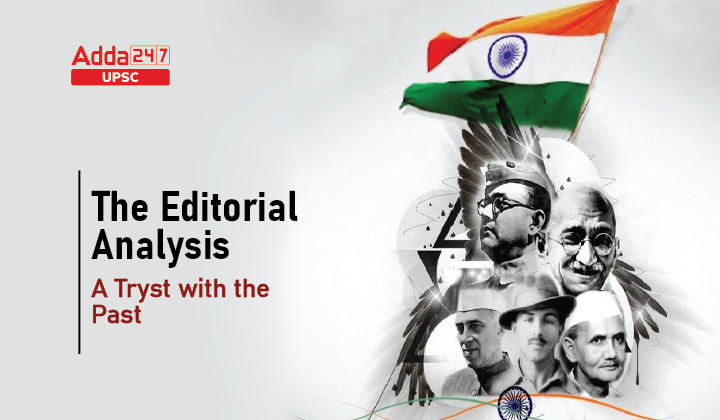Table of Contents
A Tryst with the Past- Relevance for UPSC Exam
- GS Paper 1: Indian History- Modern Indian history from about the middle of the eighteenth century until the present- significant events, personalities, issues.
A Tryst with the Past in News
- Recently, India celebrated its 76th years of Independence. Seventy-five years ago, on this day, India’s first Prime Minister Pandit Jawaharlal Nehru made first PM address from the Red Fort. Few Lines of the speech are given below-
“The achievement we celebrate today is but a step, an opening of opportunity, to the greater triumphs and achievements that await us. Are we brave enough and wise enough to grasp this opportunity and accept the challenge of the future?”
- In this context, we will discuss the various achievements and missed opportunities over these seventy five years for India.
A Tryst with the Past- Achievements and Missed Opportunities
- Achievements: There have been significant achievements —
- A constitutional scheme guaranteeing rights that included freedom of speech, religion and a secular state,
- Implementation of universal adult franchise in periodic elections,
- A thriving legislature,
- Establishments allowing for a formal separation of powers,
- A quasi-federal union of States that were reorganised on a linguistic basis,
- The building of institutions (industrial, educational, medical) that heralded progress, and
- The unleashing of knowledge and communication sectors that tied India beneficially to the world economy.
- Missed Opportunities: There have also been missteps and failings —
- The inability to eradicate extreme poverty and marginalisation even though these did come down dramatically since 1947,
- The strains in implementing the constitutional order and values,
- Burgeoning communal majoritarianism, which was decidedly rejected by both the freedom fighters as well as the framers of the Constitution,
- The incomplete nature of decentralisation of power, and
- Rising economic inequality.
- India’s Potential: India stands tall as-
- One of the world’s emerging economies with an advantageous demographic dividend,
- A vibrant democracy that ensures enthusiastic participation in elections,
- A diverse polity, and
- A diversified economy.
A Tryst with the Past- Associated Challenges
India also faces humongous challenges.
- Global Conservatism and Climate Change: Its people live in a more chaotic world where cooperation and liberal trade relations have taken a beating and where climate change is a challenge.
- Over Centralization: The emergence and consolidation of a dominant political force that seeks to centralise power and homogenise the idea of India.
- This has threatened to unravel the constitutional structure of recognition of diversity and inclusion as the means for overall progress.
- Economic progress through inclusive growth — a process that was accelerated following comprehensive reforms in the early 1990s and the institution of a rights-based approach towards welfare in the mid-2000s — has slowed down in the last few years.
- Inter-State Disparity: There is an exacerbation of inter-State disparities, with southern and western India delivering better outcomes in education, health care and thoroughgoing economic growth than other regions.
- This is an issue that requires careful deliberation in the near future.
Conclusion
- India must continue policies, framed in the 1990s, of allowing entrepreneurial energies to flourish while relying on comprehensive welfare with a rights approach, which was given impetus in the late 2000s, to help utilise its demographic potential.
- India’s progress in the 21st century would depend upon the re-ignition of the values like social justice, equality and unity in diversity.
PM Address from Red Fort on 76th Independence Day




 TSPSC Group 1 Question Paper 2024, Downl...
TSPSC Group 1 Question Paper 2024, Downl...
 TSPSC Group 1 Answer key 2024 Out, Downl...
TSPSC Group 1 Answer key 2024 Out, Downl...
 UPSC Prelims 2024 Question Paper, Downlo...
UPSC Prelims 2024 Question Paper, Downlo...




